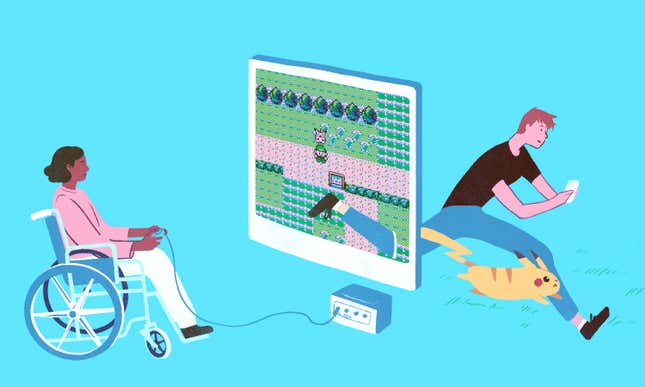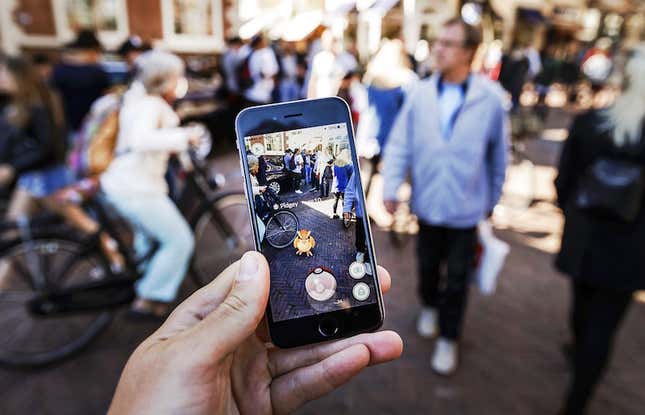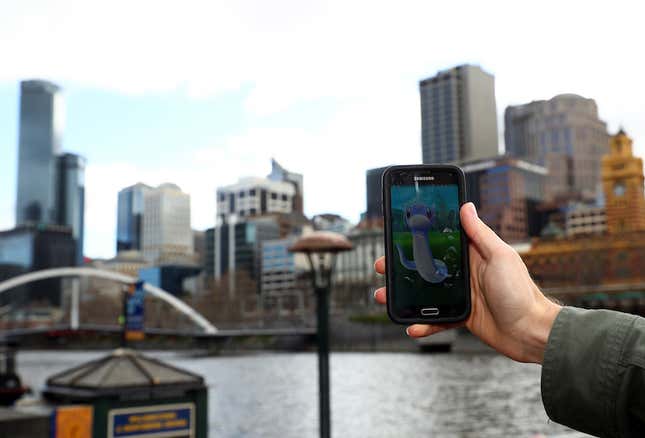
Pokémon Go is getting gamers outside, but not all gamers. Tales of trespassing, fence-jumping and brave jaunts through tough terrain to catch Pokémon have bolstered the hit mobile game’s popularity among able-bodied players. Physically handicapped fans of the Pokémon franchise, however, are struggling to love a Pokémon game in which movement is a crucial mechanic.
Some wheelchair-bound fans of the Pokémon franchise say that important game mechanics like frequenting PokéStops for items and gyms for battles, hatching eggs and even traveling around to catch rare Pokémon are exponentially more difficult for them.
Pokémon Go’s success is partly due to the game’s capacity for wish fulfillment. As kids, how many of us dreamed of embarking on a real Pokémon adventure, traveling the world with our friends to hunt down monsters? Over a decade ago, when Pokémon was just entering the American mainstream, millions of children fantasized about catching Pokémon outside the confines of their Game Boys. Pokémon Go necessitates these real-life quests, forcing players to explore their physical surroundings. The goal, to catch all the original Pokémon, requires players to explore diverse locations, since some Pokémon are location-specific.
Pokémon Go, in a way, is sort of reverse-escapism. It’s bringing the escapist fantasy of Pokémon-hunting into real life. Because of problems with accessibility, some wheelchair-bound fans—fans who found solace in the Pokémon fantasy for decades—say that Pokémon Go is alienating them from their favorite franchise.
Mandy Drago, 21, learned to read from playing Pokémon Blue. Ever since, Pokémon has been a nourishing mainstay in her life. “It’s been one of the few obsessions I’ve stuck with,” she told me. Last October, Drago collapsed. She had been suffering from an undiagnosed illness that completely enfeebles her mobility. As a result, she needs to use a wheelchair to get around.
Pokémon Go’s release has been frustrating for Drago. At first she thought she’d be able to catch creatures without moving around by laying in bed and using the in-game “Incense” item. She managed to attract Pokémon to her bedroom, but was getting a lot of lower-level repeats and couldn’t re-up her items. It didn’t feel like she was really playing. When Drago’s roommates noticed her struggling to catch Pokémon, they offered to take her phone with them when they went Pokémon-hunting outside, allowing them to fill up the Pokédex for her. For Drago, that felt even worse than playing in bed.
“That was a horribly depressing experience,” Drago said. “They came back excited to tell me about their stories and I just felt really left out.”
Video games are immensely popular among the physically handicapped population, in part, because they can bolster escapist fantasies. Exploration, something that wheelchair-bound folks often struggle with in real life, is much easier in virtual worlds, where stairs or hills can’t impede mobility. In 2008, a PopCap Games survey reported that one in five casual gamers had a developmental, mental or physical disability. Half of those gamers indicated that their primary disability was physical. These gamers play more often and for longer periods of time than their able-bodied counterparts, according to the survey.

Koby Feldman, 32 and from St. Louis Park, has played every version of Pokémon up to Black and White. He also suffers from spondylolisthesis, so his spine is fractured at several points. Later, he developed fibromyalgia. To get around, Feldman needs a wheelchair or a walker. When Pokémon Go was announced, Feldman immediately knew that he would have problems keeping up with the franchise. He’s found a way to play, but not on par with his friends.
“A lot of the PokéStops I’ve seen are tucked away on running trails, or places that aren’t handicapped-accessible,” Feldman told me. “Because of that, I can’t really go to as many PokéStops. I can’t go find new Pokémon in different places so well. And because of that, none of my Pokémon are powerful enough to get any use out of the gyms. Everything is much much harder, but still doable. The hardest part is hatching eggs. For me, walking from my bed to my bathroom can be a challenge on some days. So the idea of walking 10 km to hatch an egg...it seems like a nearly unclimbable mountain.”
Niantic did not return requests for comment on this story.
On Reddit, mobility-impaired Pokémon fans have expressed concern over the game’s accessibility ever since it was announced. “If it’s going to involve traveling around,” one wheelchair-using commenter wrote six months ago, “that’s going to be a problem.” Aside from issues with exploration, even holding a phone and maneuvering a wheelchair requires some dexterous hand-switching.
Over the last few months, these Redditors have regularly posed the question of how to play to the Pokémon Go subreddit. Although slow-moving wheelchairs or cars allow players to go to PokéStops and battle outside gyms, physically handicapped players (especially in rural areas) have more difficulty wandering around outside and searching for the rare Pokémon needed to defeat gym leaders. Additionally, these gamers report that eggs are immeasurably more difficult to hatch on wheels. (On Reddit, a story about a mother walking 10 km to hatch an Electrobuzz egg for her disabled son went viral.)

Steven Spohn, the Chief Operations Officer of the AbleGamers Foundation, which advocates for gamers with disabilities, said that Pokémon Go has left many handicapped gamers feeling more left out than ever. Wheelchair-bound fans of the franchise, or gamers more generally, enjoy games like Pokémon that have large communities with which to socialize. Pokémon Go capitalizes on the franchise’s social features, but at the expense of accessibility. “It’s a pretty unfortunate scenario for people with disabilities,” Spohn told me. “Even if Nintendo could implement every accessibility option I could dream of for handicapped gamers, they would still miss out on the social aspect of it.”
“It’s a shame,” Spohn added. “They’re just left out of another scenario.”
Pokémon Go’s release has proven to be a special, unique moment in history when millions of strangers—gamers and non-gamers alike—physically come together to enjoy a video game. For physically disabled folks, missing out on this moment exacerbates already-present feelings of alienation from society, according to sources interviewed.
In the last few years, numerous foundations have cropped up addressing the issue of accessibility in gaming. AbleGamers, Game Accessibility and Includification are just some of the organizations that are helping disabled gamers find the same pleasure in games that able-bodied gamers do. Pokémon Go presents a unique challenge to the disabled gamers’ movement. It is one of the most popular video games of all time and, simultaneously, one of the least accessible to gamers with impaired mobility.
When Mandy asked her roommates whether she could be included in their next Pokémon adventure, they eagerly obliged. “We had to change the way they played of course, which meant no hiking up steps and all that, but it worked out!” Mandy and her roommates mine PokéStops from their car, mostly stopping at lures to catch Pokémon. Glumly, Mandy added that her eggs are taking forever to hatch.

